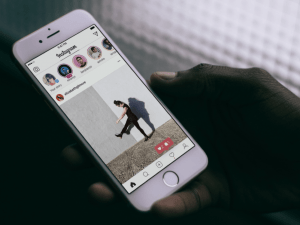By: Anna Bliss Dean, Edited by: Renee Schroeder
Posted. Now, the anxious wait for your phone screen to light up. The likes and comments of friends, offering confirmation that the photo is beautiful, creative, funny, or entertaining.
This is something that we all endure every time we post a photo on Instagram.
The purpose of Instagram is to connect with others and communicate, specifically with photos, where friends can offer likes and comments on those photos as affirmation. Instagram also allows communication through stories and direct messages. It is a relatively recent tool of interpersonal communication that comes in quite a unique format.
However, this phenomenon has major effects on young girls and can have a significant impact on their mental health. According to `Likes’ as KPI: An Examination of Teenage Girls’ Perspective on Peer Feedback on Instagram and its Influence on Coping Response, by researcher, Li Pengxiang and his colleagues, peer feedback greatly affects teenage girls. This feedback indicates peer approval and popularity, so teenage girls place great importance on it and can be deeply affected by it. This study found that negative or no peer feedback received on Instagram directly correlated to a depressed mood for teenage girls.
When I post a photo and it doesn’t receive the likes and feedback I expected it to, I feel disappointed. I wonder what I did wrong and what my peers didn’t like about my photo. I can also see exactly who liked my photo, so it’s easy to be disappointed if you don’t see someone’s name.
This feature of Instagram can have significant impacts on mental health, more than we even realize. Many teenagers and college students can easily become depressed and negatively affected by the lack of approval from their peers. Not only is Instagram a platform to receive feedback, but it also glorifies others’ lives in an unrealistic way. Viewing your friends’ lives through a rose-colored lens can make it feel like you’re missing out on something, leading to feelings of jealousy, anger and sadness from being “left out.”
Researchers Dian de Vries and colleagues conducted a study about the negative effects of Instagram. In the study, Social Comparison as the Thief of Joy: Emotional Consequences of Viewing Stranger’s Instagram Posts, they found that people can be affected in a negative way even when they see a stranger’s positive Instagram post. Feelings of jealousy and fear of missing out can easily take over and cause a negative response.
This negative response can come from friends, family, and people we know. It also can come from people we don’t know, such as famous people or “influencers.” These accounts can have an even more depressing effect on teenagers because their lives appear to be flawless and perfect.
Today, the idea of “influencers” has become incredibly popular. These are people that get paid to advertise certain products through their personal branding on Instagram. Their lives almost always appear to be perfect and set an unattainable standard. In the same way that celebrities’ lives can be detrimental to the mental health of young girls through comparison, Instagram now presents that same danger.
Social media has many positive attributes, such as allowing people to connect and share their lives with others in a way unlike before. However, the negative mental health effects are undeniable, especially on the young, developing minds of teenagers. This negative element of social media is causing problems for students in school, including their friendships and relationships with their families. We need to focus more on helping teenagers cope with the negative effects of social media and overcome these issues that can lead to depression.
There are many ways to manage an addiction to social media and peer feedback, but some effective ways include limiting the time spent on social media and not following accounts that can lead to comparison. By engaging in socially fulfilling and rewarding activities that don’t include social media, teenagers can manage their social media interactions in healthy ways.
